#broad intellectual authority
Explore tagged Tumblr posts
Text
Weak Thinking
I’ve been a student of philosophy for most of my adult life. It’s a passion, it’s an indulgence, at times it’s an obsession, and it’s a driving force in many of my most consequential actions. Digging through the canon of thousands of years of argument — hundreds of thousands of pages of dense text — can be vastly unsatisfying. It’s not for everyone. It becomes obvious there are far more questions…
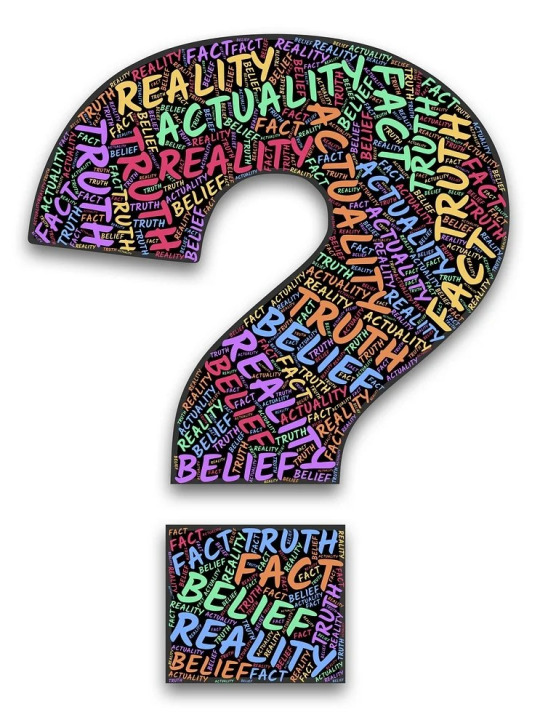
View On WordPress
#9-11#broad intellectual authority#civilized discourse#considered thought#debatable philosophy#Elon Musk#fabricated drivel#free speech#noble premise#Sam Bankman-Fried#self-esteem shields#student of philosophy#TikTok#tone-deaf#World Trade Center
0 notes
Text
Degrees of Mercury in the Natal Chart

Mercury in Aries Degrees (1°, 13°, 25°)
These degrees suggest a direct, assertive communication style. Individuals with Mercury at these degrees may be quick-thinking, decisive, and eager to take the lead in conversations. They may express themselves with passion and enthusiasm, sometimes coming across as straightforward or impatient.
Mercury in Taurus Degrees (2°, 14°, 26°)
Degrees in Taurus imply a practical, grounded approach to communication. Those with Mercury at these degrees may have a deliberate, methodical way of speaking and thinking. They value stability and may express themselves with a focus on tangible results and sensory experience.
Mercury in Gemini Degrees (3°, 15°, 27°)
These degrees suggest a versatile, communicative style. Individuals with Mercury at these degrees may be naturally curious, adaptable, and skilled at processing information quickly. They enjoy mental stimulation, learning new things, and engaging in lively conversations with others.
Mercury in Cancer Degrees (4°, 16°, 28°)
Degrees in Cancer imply a sensitive, intuitive approach to communication. Those with Mercury at these degrees may have a nurturing, empathetic way of expressing themselves. They are attuned to emotions and may communicate with a focus on personal experiences and connections.
Mercury in Leo Degrees (5°, 17°, 29°)
These degrees suggest a dramatic, expressive communication style. Individuals with Mercury at these degrees may have a confident, theatrical way of speaking and thinking. They enjoy being heard and valued for their ideas, and they may emphasize creativity and individuality in their communication.
Mercury in Virgo Degrees (6°, 18°)
These degrees imply a detailed, analytical approach to communication. Those with Mercuryat these degrees may have a precise, methodical way of thinking and speaking. They value clarity and organization in their communication, often focusing on practical matters and problem-solving.
Mercury in Libra Degrees (7°, 19°)
Degrees in Libra suggest a diplomatic, harmonious communication style. Individuals with Mercury at these degrees may have a balanced, fair-minded way of expressing themselves. They value cooperation and may seek consensus in conversations, often considering multiple perspectives.
Mercury in Scorpio Degrees (8°, 20°)
These degrees suggest an intense, probing approach to communication. Those with Mercury at these degrees may have a deep, perceptive way of thinking and speaking. They are drawn to uncovering hidden truths and may communicate with passion and emotional depth.
Mercury in Sagittarius Degrees (9°, 21°)
Degrees in Sagittarius imply an expansive, philosophical approach to communication. Individuals with Mercury at these degrees may have a broad-minded, adventurous way of thinking and speaking. They enjoy exploring big ideas, beliefs, and cultural differences in their communication.
Mercury in Capricorn Degrees (10°, 22°)
These degrees suggest a practical, disciplined approach to communication. Those with Mercury at these degrees may have a focused, goal-oriented way of thinking and speaking. They value responsibility and may communicate with authority and a sense of purpose.
Mercury in Aquarius Degrees (11°, 23°)
These degrees imply an innovative, unconventional approach to communication. Individuals with Mercury at these degrees may have a progressive, forward-thinking way of thinking and speaking. They enjoy exploring new ideas, advocating for social change, and may communicate with a detached, intellectual style.
Mercury in Pisces Degrees (12°, 24°)
Degrees in Pisces suggest a sensitive, intuitive approach to communication. Those with Mercury at these degrees may have a compassionate, imaginative way of thinking and speaking. They are attuned to subtleties and may communicate through symbols, metaphors, or artistic expression.
©️kleopatra45
#astrology community#astrology#astroblr#astrology readings#astrology tumblr#astro notes#astrology observations#houses in astrology#mercury in the houses#mercury
741 notes
·
View notes
Text
Reflection on Fanservice and the Hypmic Movie A.K.A. I Can't Stop Thinking About That IchiKuu Bait (But, Like, In An Intellectual Way)
Watching the Hypmic movie pushed a concept I'd been thinking about to the forefront of my brain: how to write cohesive fanservice.
Fanservice occupies an interesting place within a work by being both a departure from the main plot or setting while simultaneously furthering the works' overarching goals. Fanservice has to be Part of the whole but also recognizably Not--to acknowledge that something is fanservice is to set it apart from the rest of the work with a knowing wink, to say that this aspect of the work is in someway closer to the fourth wall than the rest. If we imagine elements of a fictional work to be two-dimensional panels, inserting fanservice is suddenly turning this two-dimensional stage on its side and revealing that the fanservice panel is closer to the audience than all the rest. It's adding a literal new dimension to the work.
Because fanservice is meant to provide some desirable Thing that cannot be satisfied within the constraints of the main work, fanservice often exists in a quasi-universe of its own. It's like we've jumped onto a new plane--one closer to the audience--when we shifted from the previous two-dimensional panel to the fanservice panel. This plane plays by different rules. Fictional characters can seduce the audience. Men can kiss men; women, women in otherwise heterosexual universes. Then the fanservice ends, the perspective snaps back to the previous plane, and the rules of the universe resume. Fictional characters can't flaunt sexual behavior to an audience whose existence they have no awareness of; homoeroticism can't be anything more than a joke when male/female is the only flavor romance comes in. Whatever happened in the previous panel breaks the rules of the universe--so what happens to it? In most cases, the events of the fanservice panel simply never happened in the main storytelling plane. They're never acknowledged again or contribute to plot, characterization, or themes. Fanservice simply floats on its own plane, disconnected, and can only ever be evaluated in respect to other events in that same plane.
And while that makes the fanservice no less compelling (this isn't a rant against fanservice), doesn't that feel like a waste? Why include a story element if it doesn't work toward some common goal?
Well, it does! Fanservice explicitly performs a feature the rest of the work handles implicitly: defining a target audience. Other story elements (plot, genre, characterization, etc.) create a synergistic effect that suggests certain things about the author's intended reader. People who enjoy misogynistic, medieval fantasy powertrips might also enjoy big titty anime men; handsome, spindly men who solve murders and get covered in blood might also appeal to those who want to see blood-covered men making out. Fanservice rewards those audience members for finding the work and, perhaps unintentionally, can drive away audience members outside of the intended audience. Apart from sheer joy on the author's part to include it, fanservice creates messaging about in-groups and out-groups. Don't like elf titties breasting boobily at the slightest provocation? Stop watching isekai. Don't want to see bloody dudes sucking face? Get out of the ikemen aisle. And so on.
This can cause difficulties, then, when a translator falls outside the target audience. While most established translators have an (often broad) focus, there is generally an aspect of "I sure do like having money for goods and services" that informs a translator accepting a particular assignment. One of the most common complaints I see about otherwise sound translations is a translator failing to recognize fanservice cues or play up fanservice to the degree expected by the target audience. On one hand, this can be really frustrating for the audience! It's understandable to feel slighted or robbed of part of the fun. On the other hand, it can require a lot of extra, unpaid work for a translator to familiarize themself with niche tropes/kinks/etc. It can also be profoundly uncomfortable to write--and attempt to write well!--something you find morally repugnant.
I think matching the author's energies is one of the few things I'm genuinely very good at, so I put a lot of thought into fan service. What does the target audience for this particular type of fan service like, and why do they like it? How should the why factor shape the English text? (This can be fun! Weird kinks? Well, I'm not in the having sex fandom, so off to Ao3 I go. Huh! Here's a byline running through most of these fics--this must be one of the central draws of the kink. I see that same byline in the work, and now I understand the author's intent better. Let's make sure to include that in the translation. This can also be...less fun. My job is to make sexual assault and incest look hot! I'm...not a fan of either of these! I don't really like looking at them, even in fiction! But hey, let's go figure out what the appeal is and see if it can't be reproduced here! Do I feel gross writing it? Yeah, I do. Does that make it any less of my responsibility to do a good job? Personally, I don't think so.) At the same time, it's important that the fanservice doesn't become so off the walls that it fails to integrate into the rest of the translation
This ties back into the question I asked earlier: Isn't it a waste for a story element to be so divorced from the rest of the text? Wouldn't it be nice if fanservice offered something more?
Enter what I call "cohesive fanservice." (I flirted with the term "effective fanservice" but I think that's disingenuous, because fanservice usually serves a different purpose than the rest of the text.) Cohesive fanservice is fanservice that contributes to the rest of the story--be it plot, characterization, themes, whatever.
But wait! Fanservice operates on a different set of rules from the main universe. How are those different rules reconciled? This is usually handled in one of three ways:
The rules aren't reconciled, and the audience is asked to consider the implications of this discrepancy. Here's a fourteen-year-old shaking her butt for the camera in a universe where fourteen-year-olds are sexy. Now we return to the regular universe where that's not true. What does your reaction say about yourself? What does this say about how we as a society sexualize young teens? And so on. It should go without saying that this is not the same thing as pushing the idea that fourteen-year-olds are sexy throughout the entire work. There must be a deliberate attempt to challenge the audience and/or discuss the topic.
The rules aren't reconciled, and this discrepancy has consequences in the plot or characterization. In one of the jobs I alluded to above, a fanservice scene sells a "hot" portrayal of sexual assault. In the rules of the fan service plane, sexual assault is acceptable. But upon returning to the rules of the normal plane, sexual assault is no longer acceptable. Sexual assault is scary and very serious! The assaulter and her victim have a falling out, and we're forced to examine what made the assaulter ever think it was acceptable to force herself upon the victim to begin with. How the assault changes the victim and assaulter and how, if ever, the assaulter can regain the victim's trust are then discussed through the remainder of the series. The discrepancy and its consequences furthers the plot and the characterization thus contributing to the story. While I didn't like translating this scene (it was emotionally draining for maaaaany reasons), I liked what it did for the story and respected the author's choice to include it. I think it's well-written even if not personally enjoyable.
The rules are reconciled because the fan service, outside of its main premise, obeys all the rules of the main plane. Not the same thing as "there's a heterosexual explanation for this." If a character bares their boobies to the camera, then we should expect them to be interested in showing off their body outside of fanservice. If one handsome man waxes poetic about another, he should be the type to deliver heartfelt monologues in general. In a work I have truly egregious creative freedom on (and thus the equally daunting obligation to produce good fiction no matter what), I frequently run up against fanservice walls of this nature. If the author wants character X to do Y--something they never, ever do--it's my job to figure out what would compel X to do Y, how this unknown third thing interacts with the world of the story, and how doing Y affects X. This is Really Damn Hard.
And here I turn to Hypmic for inspiration, because Hypmic is often superb at this third type of cohesive fanservice.
Hypmic is so fanservice heavy it affects the series' ability to cohere--just look at any time the worldbuilding is examined with any degree of seriousness. Between the contradictory and constant needs for the characters to look Hot, act Gay, and be Goofy Goobers (humor can 100% be fanservice), it's kind of a miracle there's any consistency anywhere. Except it's not a miracle--it's really, really good character writing.
Things like ARB that are almost pure fanservice don't need to cohere; there, it's fine if the story jumps back and forth between fifteen hundred different planes because the primary purpose is to entertain. Why not have pterodactyls and also body swapping? You want hot boys too? Sure! Have little a Gentarou bare arms. As a treat. Doppo and Hifumi are confessing their undying love in the corner? Sounds good! Why the hell not! Whee!
But because none of the stakes matter (if ARB!Dice got mauled by a bear, Gentarou and Ramuda would laugh, and then he would show up in the next card alive, shirtless, and pitifully covered in glue), it's hard for audience members to feel emotions outside of levity. Now it's more important for fanservice to follow the rules of the main story plane--because if those rules break in fanservice, why should the audience ever expect them to hold at other times?
Hypmic doesn't always succeed at this, but when it does, it does it very, very well.
The Hypmic movie has lots of good examples of this, but I want to narrow in on the three First Stage leader kiss tease scenes, especially now that the official account gives us references I can legally screenshot and share. There's one that I think is very, very cohesive (IchiKuu), one that I think is not at all (SasaSama), and one that is cohesive on a technicality so bizarre it deserves to be looked at too (JakuRamu).
As a side note, this has nothing to do with my personal enjoyment of the ships--I like SasaSama and IchiKuu pretty much equally. I'm coming at this with my translator hat on, which isn't necessarily objective but is informed on "what do the authors want to convey" and not "what do I, personally, want to focus on."
Let's start with IchiKuu!
Kuukou marches right into Ichirou's personal space and forces Ichirou to lean very far back for the duration of his verse. Then, in Ichirou's verse, Ichirou reverses the position.

Kuukou is shown grinning, and his eyes flare in interest.

(Please ignore the...I can only hope accidental...innuendo in Ichirou telling Kuukou to "take his overwhelming vibes" lol)
I don't think the overall premise of any of these scenes is especially coherent (can you imagine being Juushi in this moment and sweating in nervous horror as Kuukou holds world's most wicked lean, hips fully under Ichirou's, for a solid ten seconds? The way this would blow up on the internet... The questions you, as Juushi, would not be prepared to answer... The pointed silence from Hitoya in the car on the way home... Like come on lol), but each individual action feels true to the character. Both Ichirou and Kuukou would do those things unprompted.
Kuukou is physically comfortable with Ichirou, breaks social conventions, and otherwise gets in people's personal space all the time. Here are two quick examples from DoD chapter 3, which occurs before Ichirou knows Kuukou well.
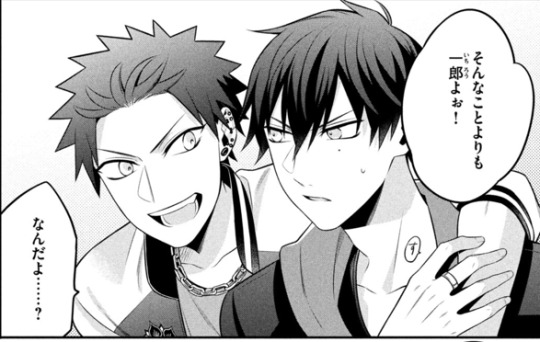

We've seen Kuukou be aggressive (often and always) and invade Ichirou's personal space in somewhat odd ways, so it makes sense that he'd do so here.
We also know that Ichirou matches Kuukou tit for tat, even when he probably really shouldn't (see Ichirou watch Kuukou break his own arm, call him an idiot, and start fighting him in DH/BAT chapter 9), so it's reasonable to assume Ichirou will ignore common sense and do the exact same thing to Kuukou.

Then, and this is the part that THRILLED me because it showed such deep understanding of the character, Kuukou grins and eats up every bit of Ichirou flexing on him.
A recurring theme in Ichirou and Kuukou's relationship is the idea of Kuukou admiring Ichirou for being "strong." From that same chapter, here's Kuukou admiring Ichirou for beating him up (and being stupid enough to try and beat him up) while expressing anger that someone so cool (again, I must stress, "cool" to Kuukou means physically ripped and dumb as a stump) would be engaged in a morally rotten pursuit like shaking people down for money.

Kuukou doesn't just want to beat Ichirou. Kuukou wants just as badly to see Ichirou beat him and delights in evidence of Ichirou's strength. That's why we see his eyes light up, and that's what cements this scene to me as an amazing piece of fanservice. It reinforces everything we know about these characters and their dynamic and would be feasible, if not a bit exaggerated in this intensity, in a non-fanservice scenario.
Unfortunately, the SasaSama scene falls flat to me for these same reasons, which is an issue a lot of Samatoki and MTC fanservice shares.
Sasara leans in close to Samatoki's mic. Samatoki backs away slightly, surprised, then leans back in with an aggressive look. The camera lingers here for a while as the same "indirect mic kiss" is repeated with the second and third liners. It's reminiscent of MTC's and SasaSama's cigarette kisses.

While I agree with the framing--Sasara doing something to surprise/annoy Samatoki is in character--I think this scene is limited by its position in the song (a chorus where everyone does the same thing; if I recall correctly there's another moment like this further in which isn't much different and similarly failed to impress me) and the need to sell the image of sexy MTC.
It's not that I think MTC is unsexy. It's that I have no reason to believe Samatoki has any desire to make himself look sexy to us.
Compare this image of suave Hifumi (FP/M+ chapter 3) to one of Samatoki breasting boobily (BB/MTC+ chapter 22).

Hifumi is an entertainer by trade. Even not in front of a in-universe audience, as is in this scene when it's just him and the BBs, it makes sense that he would swivel his hips and push his hair back for the IRL audience because he plays up to audiences.
But Samatoki doesn't work in entertainment. He wants to appear tough, not sexy, so it makes no sense for him to turn to the audience and flaunt his body. For this to look natural, the manga often showcases his physical form as incidentally attractive while intentionally threatening.

It feels believable that Samatoki would lunge at the audience and if his shirt just happens to press itself against his massive pecs... oh no... woe is us who have to see that...
This is what makes the cigarette kisses as a whole feel weak to me on a characterization level.
Take the famous SasaSama cigarette kiss in TDD chapter 5 (a chapter so old I don't have it in Japanese...). What reason does Samatoki have to look attractive for the audience? What would compel him to light his cigarette from Sasara's instead of using a lighter, either his or Sasara's?
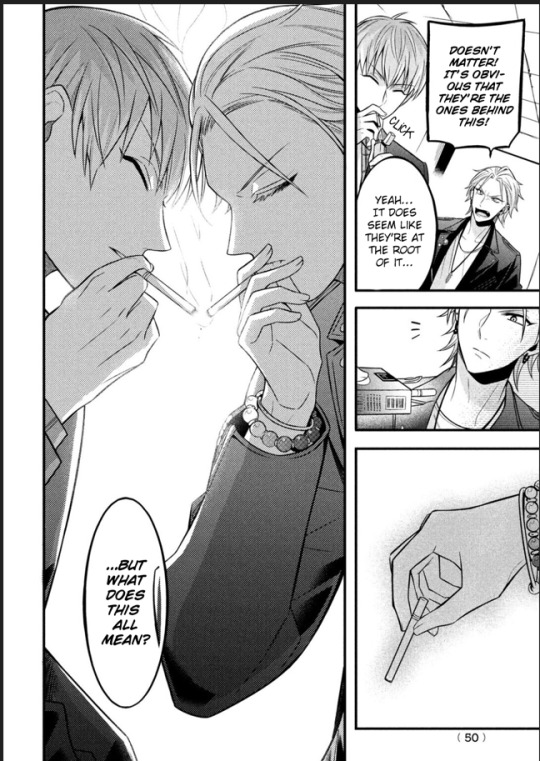
In general, I think many Hypmic writers struggle to write in-character MTC fanservice because MTC has far fewer reasons to pander themselves. Not only do Samatoki and Juuto have a vested interest in making themselves appear unapproachable, all three have difficulty (at first) trusting one another and (later) showing affection for one another. It's one of the group's core conflicts. While some groups can fall back on shenaniganry (Ramuda tackles Dice! Kuukou whacks Hitoya on the back! Ichirou bearhugs his little bros! and so on), MTC can only do so sparingly to avoid either a) being out-of-character or b) tarnishing the group's tough guy image, which is a major part of MTC's IRL sell. As a result, MTC (and Samatoki in particular) can often feel stiff or muted in group shots, which I felt hard in this movie and in certain segments of the stage plays.
How can this be mitigated? Apart from incidental fanservice (here's a good one from DH/BAT chapter 11--Samatoki lost his lighter in a fight, so he's forced to ask--and therefore trust--Sasara and just so happens to be a pretty boy in the process) and the odd MTC goofball moment, I'd love to see more authors lean into MTC's desire to have connections.
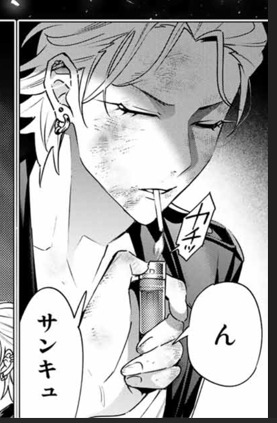
Here's an example from the BB/MTC+ epilogue that handles a group shot with stupendous ease. In it, Samatoki is watching the Buster Bros and Fling Posse after Fling Posse wins the 2nd DRB, swears, is prompted by his teammates, and leaves with a promise that MTC will win the next DRB. This is nothing exceptional--virtually every MTC loss in every medium ever goes exactly like this--but the presentation changes everything.
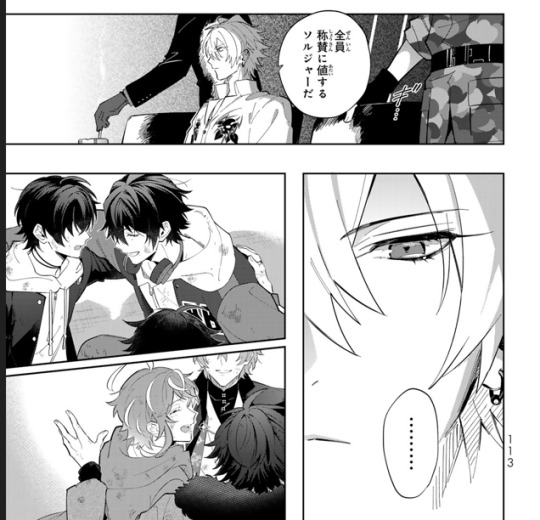

The deliberate pacing, the focus on Samatoki's attention, the refusal to show Samatoki's eyes/facial expression after the close-ups on the teams hugging, the stark shot of the palpable distance between the MTC members, the hunch in Samatoki's shoulders, and the close-up on Juuto's left-behind cigarette tell a completely different story than "Grr, I'm so tough I'll swear and say 'we'll get 'em next time.'" Suddenly, MTC isn't reticent because it's cool. It's that they're so stuck being cool it forces them to be reticent, but that's a heavy burden and not one MTC bears lightly. That's completely in-line with their characterization and a fantastic take on them! I want to see more like this!
As for what to do about the SasaSama kiss tease... I'd love for them to have justifiable, in-character actions that in turn support their dynamic. Sasara getting in Samatoki's face is fine; he can easily do so if his purpose is to annoy or as part of a physical gag. Samatoki can then fall for the bait and lean further in or grab Sasara by the collar and tug him forward intimidatingly--here's that happening in canon in DoD chapter 4--whereupon we can have another, less surface-level interaction.
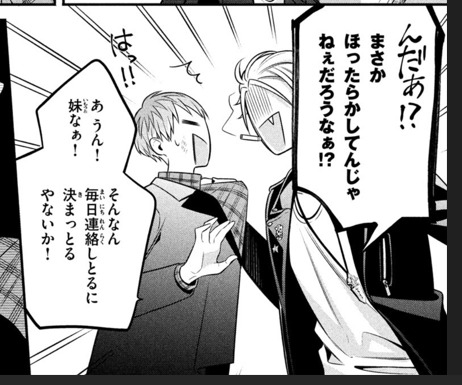
Sasara and Samatoki's theme is partnership, so a good piece of fanservice should lean into that. Either Samatoki could suddenly finish the joke (as part of a verse, perhaps?) Sasara started (causing Sasara to be surprised, then elated) because Samatoki's a dork and a softie at heart--source: literally all of canon--or something happens to Samatoki's mic, necessitating Sasara to offer his and letting Samatoki finish the verse from Sasara's mic. (Sasara can still remain in kissing distance to chaperone it as need be.) Inherent trust, leaning on one another, etc. etc. I get that it's difficult to stress partnership in an adversarial scenario, but there's really so much room for creativity here. It's a shame we didn't get more.
Maybe the writers were saving all their creativity for whatever the fuck Jakurai and Ramuda were up to.
In this scene, Jakurai advances at Ramuda during a verse. Ramuda backs up, loses his balance, and falls on his backside. Jakurai, in a certified Jakurai moment, kneels down until he's straddling Ramuda and delivers the rest of the verse a few centimeters from Ramuda's lips. Ramuda blushes. (His model blushes often and freely in the film, including several other times Jakurai's around.)

In some versions of the film, there's a shot of this from the back where you can't see what's going on. This is a common visual shorthand for kissing or sex in JPN media.
Ramuda eventually has enough, flips Jakurai over, climbs on him, and repeats the same procedure. Jakurai looks vaguely unamused like he wasn't the one who started it.
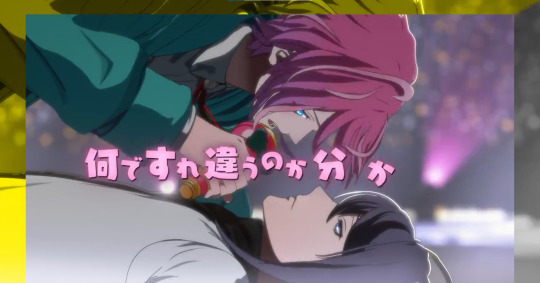
I can't begin to pretend this is a sensible thing to do, so I won't. I cannot formulate a single good reason for Jakurai to have done this. (Ramuda has a weak case for payback, and I'd even understand it if Ramuda started it, since he gets in Jakurai's face to a) be obnoxious and b) bring Jakurai "down to his level" all the time--but Jakurai???) There's an element of entertainment in the DRB which allows us to suspend our disbelief for choreo and other flashy movements, but this isn't choreo and Jakurai is not a flashy character.
However, I can't knock it as hard as I knocked the SasaSama bait because, in ass-backward fashion, Jakurai has canonically exhibited so much inexplicable behavior toward Ramuda in the name of fan service that it's in-character for him to act bizarrely around Ramuda.
This psuedo-canonization of Jakurai's freakshit rests on three things:
Jakurai's universal character trait of socially atypical behavior and difficulty understanding social dynamics. Because Ramuda also behaves atypically and is inappropriately touchy-feely/affectionate in general, this gives all their TDD shenaniganry credibility. It's not. Hmm. It's not not distracting and obvious fanservice whenever Jakurai stares at Ramuda for five panels and the mangaka busts out the lens flares, but there's a whole canon's worth of characterization that the assertion "Jakurai is oddly hung up on Ramuda" can comfortably rest on. We see Jakurai nursing a similarly long-lived (if less in our faces every second of the day) hang-up on Hitoya.
Good lord, the sheer quantity of it. Like DoHifu or GenDice, there are so many examples of fanservicey behavior to point to that they can't all be written off as flukes. That is, we can accept to some degree that Samatoki and Sasara didn't really rap a chorus in kissing distance according to the rules of Hypmic's main story plane--romantic relations between the characters don't canonically exist and, uh, it'd be awkward to be that close. We can't write off every single instance of Jakurai being weird at Ramuda without it breaking the story. To some extent, lack of romantic relations be damned, Jakurai and Ramuda are getting handsy and being obsessed with each other.
Some JakuRamu fanservice is coherent fanservice type 2--it breaks the rules of the main story plane (no gay time for rappers) and this has consequences. Characters will remark that Jakurai and Ramuda are atypically close or even that they obviously want to be closer, two such conversations of which take place in this movie. Here's a more obvious example in the TDD vol 4 bonus. Samatoki and Ichirou find Jakurai's Ramuda-braided hair weird (there's flag 1, socially atypical behavior) and comment on the two of them being especially close (flag 2).


Here's Samatoki being annoyed at their bullshit as a freebie. (I just love the way the mangaka draws him here haha. "What the hell does that [made-up word Ramuda pulled out of his ass to describe him and Jakurai] mean?" He's so long-suffering.)

These three factors essentially instate a rule in the story plane such that, left to their own devices, Jakurai and Ramuda will engage in largely inexplicable shipbait behavior. Which is outrageously funny.
GenDice and HifuDo fall in the same camp, with the latter having somewhat stauncher reasoning (lifelong best friends) than the former (Gentarou, uh...gets a kick out of fucking with Dice). The thing is, whereas this was undeniably intentional with HifuDo--we see this degree of shipbait laid out for them in the earliest pieces of Hypmic media--and arguably so with GenDice, I genuinely don't know if the Hypmic writers intended for JakuRamu (especially Jakurai) to progress in quite this fashion.
While it's clear from creator comments that there is a central writing team and that creators are expected to follow certain mandates from this team, creators are also given a surprising degree of creative freedom. When one creator--a voice actor in a live, a stage actor in a show, a manga artist in a chapter--does something the central writing team/other creators think is clever, this will be picked up and added to the character. One example of this phenomenon is Kuukou backflipping, something first introduced in the stageplay and now ported to the movie. So while early drama track Jakurai is not unreasonably hung up on his old friend and betrayer Ramuda, the manga artists came out the gate swinging with their own agendas. As other manga original content was added to Jakurai's character (much of his body language in the stage play is from the manga; the hand motif is largely from the manga), I can't help but wonder if this came along for the ride. Sure, JakuRamu was always meant to be a marketable ship, but did the writers intend Jakurai to be the driving force of so much of it?

In conclusion: Did these three kiss teases feel "earned" to me?
IchiKuu? Yes.
SasaSama? No.
JakuRamu? By virtue of a loophole...I guess so?
179 notes
·
View notes
Note
Any tips for reading academic/dense texts? I’m out of practice and without the guide of a professor to patiently explain every single thing it’s pretty hard getting back into it. Got any advice for improving one’s reading/comprehension abilities? I was reading Gramsci the other day and gave up. So we are talking pretty dire straits.
read a few book reviews or a secondary essay that summarises the text's arguments and significance. these readings are not definitive and you may very well end up disagreeing with them, but knowing what someone else made of the work can help you know what you're looking for when you read it yourself
read the introduction and conclusion first, then tackle the body chapters. this is similar to the above strategy in that it can clue you in to the main arguments and significance of the text before you delve into specific details and arguments. it helps keep you oriented if you know generally where a chapter is going and why. where applicable, you can also read the intro and conclusion to each chapter before reading the middle bits
academic texts are context-bound just like any other writing. if a book is baffling you, it can be clarifying to ask questions like: whom is this trying to respond to? why is the author setting these particular parameters of debate? what arguments or events is the author building on, answering, or taking for granted a reader's awareness of? you don't have to become an expert in every author, their political context, or their intellectual influences, but it often helps to pick up the broad strokes
keep a running lexicon of any specific jargon, vocabulary, or neologisms the author introduces. get into the habit of 'translating' sentences, at least in your head, by replacing all such terms with their definitions when necessary. sometimes you might even find it helpful to draw up some kind of diagram showing how terms relate to one another, like a taxonomical tree or other scheme
don't be afraid to skip around. if a chapter or section is particularly dense, baffling, or irritating, it might make more sense if you come back to it later, after reading other bits of the argument. academic non-fiction follows varying organisational schemata, and often chapters and sections stand on their own (& may even have been written as separate pieces, for instance intended for journal publication)
annotate (i like underlining and scribbling in the margins) and take notes (i like to remind myself what page number i can find a specific topic on) as necessary. the goal is not to disrupt your reading flow, but to give the future you the ability to look back and quickly identify what you thought was important or interesting in a text
895 notes
·
View notes
Text
Book Review- The Wealth Elite: A Groundbreaking Study of the Psychology of the Super Rich, by Rainer Zitelmann Notes
I came across this book because I was looking for psychology books. I found the first of the book rather boring and too textbook-y. The second part is much better.
The author interviewed like 45 millionaire - billionaires. These were his findings.
—
48% stated that real estate was an ‘important’ source of their wealth, and one in ten described real estate as the ‘most important’ aspect of their personal wealth-building. And a total of 20% described stock market gains as an ‘important’ factor in wealth-building, although in this case only 2.4% stated that this was the ‘most important’ factor in building their wealth.
‘Creative intelligence’ is key to financial success. The following is a comparison between the percentage of entrepreneurs (and in brackets the percentage of attorneys) who agreed that the following factors played a decisive role in their financial success: seeing opportunities others do not see: 42 (19); finding a profitable niche: 35 (14).
The role of habitus
* Intimate knowledge of required codes of dress and etiquette
* Broad-based general education
* An entrepreneurial attitude, including an optimistic outlook on life
* Supreme self-assurance in appearance and manner.
He identifies a key quality that is essential for any prospective appointee to the executive board or senior management of a major company: habitual similarities to those who already occupy such positions.
Skillset of Entrepreneurs
* The ‘conqueror’. The entrepreneur has to have the ability to make plans and a strong will to carry them out.
* The ‘organizer’. The entrepreneur has to have the ability to bring large numbers of people together into a happy, successful creative force.
* The ‘trader’. What Sombart describes as a ‘trader’, we would more likely call a talented salesperson today. The entrepreneur has to “confer with another, and, by making the best of your own case and demonstrating the weakness of his, get him to adopt what you propose. Negotiation is but an intellectual sparring match.”
Entrepreneurial success personality traits
* Commitment
* Creativity
* A high degree of extroversion
* Low levels of agreeableness
Entrepreneurial success personality traits
* Orientation towards action after suffering disappointments (the entrepreneur remains able to act, even after failure)
* Internal locus of control (the conviction “I hold my destiny in my own two hands”)
* Optimism (the expectation that the future holds positive things in store)
* Self-efficacy (the expectation that tasks can be performed successfully, even in difficult circumstances).
constant power struggles with their teachers in order to ascertain who would emerge the stronger from such confrontations.
Secret of selling
* Empathy
* Didactics
* Expert knowledge
* Networking.
Conscientiousness is the dominant personality trait. Extroversion is also very common among the interviewees. Openness to Experience is very common
A high tolerance to frustration is one of the most characteristic personality traits of this group.
exceptionally high levels of mental stability.
primarily characterize entrepreneurs as being prepared to swim against the current and make their decisions irrespective of majority opinion.
“No, I never did that (lost my temper). I never get loud. But I can be resolute and say: “That is unacceptable.” And then you either have to go your separate ways or make a decision that the other party might not like. It’s the same in negotiations. I was always described by other people as a bit of a toughie.”
Having the courage to stand against majority opinion is probably a prerequisite for making successful investments, as this is what makes it possible to buy cheap and sell high.
Many of the interviewees spoke about their ability to switch off and direct their focus, even in the event of major problems. The interviewees consistently referred to their ability to focus on solutions, rather than torturing themselves with problems.
At least in the initial phases of wealth creation, most of the interviewees rated their own risk profiles as very high. This changes during the stabilization phase, when risk profiles decrease. In this phase, the hypothesis of moderate risk does apply.
Conscientiousness was the interviewees’ most dominant personality trait. It is important to remember that the Big Five theory’s definition of conscientiousness does not just include qualities such as duty, precision, and thoroughness, but also emphasizes diligence, discipline, ambition, and stamina.
#c suite#powerful woman#strong women#ceo aesthetic#personal growth#that girl#productivity#getting your life together#balance#book review#books
415 notes
·
View notes
Text
Into the Ether (1)
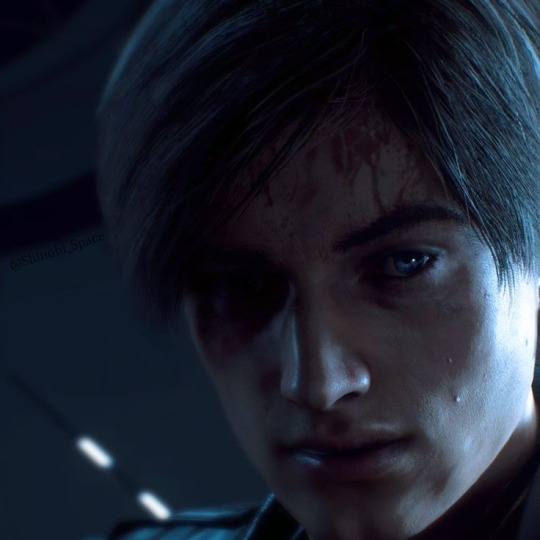

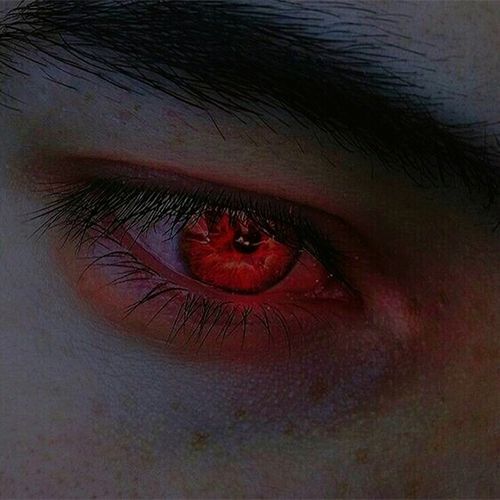
Series Masterlist
Pairing: Vampire! Toreador! Leon Kennedy x Fem! Reader
Summary: At the all-night events cafe you run, you’ve become acquainted with an elusive patron, Leon, though you can never remember the last moments of your interactions together. After a harrowing encounter, a love-hate relationship develops between the two of you as you grapple with your newfound status in a world of darkness and investigate the reasons behind the untimely attacks.
Content & Warnings: 18+ Resident Evil x Vampire: The Masquerade crossover, horror, mystery, romance, slow burn, strangers to enemies to lovers, angst, fluff, eventual smut, swearing, smoking, alcohol, drug references, non consensual blood drinking, blood bond, vampire turning, violence, injury, mild gore, torture, religious themes, minor character death, RE ensemble, VtM concepts.
Author's Note: Super excited for this crossover series! I’ll try to keep a regular update schedule on Wednesdays. I might take some liberties with VtM lore and mechanics to fit the story, but hope to stay as true as I can to the source material. Finally, I imagined RE2R Leon (my favorite!) in this role 🫶
AO3 Link
Chapter 1: RC By Night
You first saw him in summer, when the days were long and the nights were short, and the streets came to life again. There was the heady smell of pollen in the air and the humidity was sweltering. Just a couple of months after you and a bunch of idealistic friends from your theater school days had taken the plunge, and opened an all-night cafe in one of the cheaper, grittier areas of town, east of the river of Raccoon City.
It had been a scrappy little project, one you didn’t expect to receive a cult following and gain in popularity amongst the intellectuals and counterculture crowd. But then again, there was also the City College nearby and the events program you’d lined up each week drew them in. From comedy nights and disco fevers to site-specific and performance art, you knew what people liked and how they wanted to be entertained. A bit of kitsch, a sprinkle of avant-garde and a generous dose of unpretentious social drinking. It pulled him in too.
Him. You didn’t even know his name. The first thing you had noticed were his striking blue eyes that seemed to glow from the shadows of the dimly lit space, peering out at you. Always observing, always watching, never speaking. Sometimes he’d glance over across the opposite end of the room at another pair of companions — a rugged, broad-shouldered man with a dark crew cut bumping shoulders with a younger, spunky redhead in a matching biker jacket. They’d exchange subtle looks of recognition and mild suspicion before returning to whatever they were doing. Though they never uttered a single word to each other.
He came back week after week, ordering the same drink each time, but never touching it. One Manhattan, please. You obliged. A waitress you had sent over to pry on your behalf told you he enjoyed the cocktail, but couldn’t tolerate much alcohol. You saw him lift the drink to his nose, sniffing it as the corners of his mouth turned upwards, silently smiling to himself before he placed it back down on the table again. Strange. You shook your head and prepared a cup of black coffee, taking it over to him as his eyes lit up in surprise with your approach.
“On the house,” you explained, plonking it down on the table. He raised an eyebrow but remained tight-lipped.
Maybe he didn’t like coffee? Or how did he usually take it? “Uh—” you turned back towards the service area, as if to check that the condiments were still in place. “Would you like some creamer or sugar to go with it?”
He raised his hand to indicate it wasn’t necessary and his jaw clenched, before fixing it into an awkward smile. “Thank you.”
Those were the first words he had spoken to you. It rolled off his tongue like a swirl of mist, a sliver of a dream you couldn’t quite remember when waking up. You took another step forward to get a better look at him. He had a baby face, angelic almost, with that typical, boy next door charm your mom would have gushed at, and you imagined he couldn’t be older than his early twenties. Upon closer inspection, he seemed slightly pale, faint dark circles around his eyes that had seen more than his fair share for his age. There was a sense of weariness and jadedness behind them that made him appear older than he was.
Bringing the cup to his lips, he sipped a small mouthful, letting it sit for a moment, before swallowing it down languidly. You admired the curve of his Adam’s apple, bobbing as the liquid poured down his throat, littered with freckles and specks of moles. Something about his very presence mesmerized you, even more so than earlier. It was hard to place a finger on what it was exactly, and why this feeling seemed to grow with every second you were lingering near him.
He pulled out a pack of cigarettes, tapping it on the table before offering one to you. Why not? You were a social smoker and took it as a sign to join him. In fact, there was no other place you’d rather be at the moment. You were confused, but did not question it as you took a seat beside him, noticing that he flinched each time he flicked open his lighter to ignite a flame.
His fingertips brushed across your wrist as he lit your cigarette, causing you to shiver in response, while his jaw tensed again, as if trying to rein something in. Licking his lips, he took a puff from his own, exhaling the smoke as it billowed around him and for a second you thought you’d lost him to a wall of fog. Both of you continued smoking in silence, checking in with each other through furtive glances, even though there was nothing to be ashamed about.
At some point, you followed the direction of his gaze and saw that same pair of companions he often regarded from the corner of his eye. They were frowning, giving him dirty looks as he shrugged nonchalantly in return.
“Not much of a talker, are you?” you broke through the thick stillness of the air that surrounded the both of you like a bubble, separated from the rest of the evening revelers.
“You’re observant,” he teased, his eyes crinkling as he stubbed out the leftovers of his cigarette in the ashtray. You followed suit.
“So, what brings you here?” you asked, gesturing to the suit attire sans tie that he was wearing. “Don’t get me wrong, but this place doesn’t exactly seem like the kind you types hang out at.”
“Hm,” he huffed, though your question didn’t phase him. “And what exactly is my type?”
“I’d say you were a yuppie,” you blurted out, your mouth rarely had a filter on these days. “But I can’t be sure, something about you seems…”
“Off?” he offered, smirking, yet his expression carried a hint of somberness.
“Different,” you corrected, but mumbled out a quick apology nonetheless soon after.
“Don’t be,” he grazed your hand again as he adjusted himself in his chair, and you felt like he was doing this on purpose. “At least you’re honest. It’s a rare quality to find these days.” Though the way he said the last sentence sounded loaded with a double meaning.
“These days?” you guffawed. “You’re speaking like an old man.”
He joined in your laughter though that was the end of your conversation for that night. The rest of the evening went by in a blind haze, and you found yourself in a dazed state later on in the wee hours of the morning, still sitting at the same table, but your newfound friend gone without a trace. None of your colleagues had noticed a thing. You didn’t even get his name, but you shook yourself, commanding your limbs to get back to business and clean up after the customers that had left.
The next time you saw him was when you were hosting the karaoke night of the month. Decked out in a shimmery mermaid glitter jumpsuit, hair tied up in pigtails and face caked with extravagant make up, you hopped onto the stage, only to nearly stumble on your flimsy heels when those piercing blue eyes landed on you from the all the way back. Of all the nights he could have dropped in, he chose this one.
You suppressed your embarrassment and warmed up the audience with a couple of well-placed jokes before kicking the event off with those who had registered to participate. It appeared to be a tough crowd as you only had a handful of sign ups, and would need to potentially seek out volunteers when they were done. You hoped the rackety sound system would hold up till then too.
Fortunately, when it came to the crunch — which it did — you always had an ace up your sleeve. “You there,” you called out, pointing towards the back of the room. “Yeah, blue eyes, you.” Crooking your finger, you beckoned him over, waiting in anticipation to see what he would do.
To your surprise, he bowed his head, accepting the challenge, before slowly weaving his way through the crowd, who were cheering him on with your prompting, towards the stage. He flashed you his pearly whites as he climbed up the short stairs, his floppy bangs bouncing with each step. For a moment, you thought you caught something feral in his gaze, but it dissipated when he reached out for the mic from you, his hands sweeping over yours with an electric touch.
You were in awe of him, like almost everyone else in the cafe, when he broke out in a rich tenor voice, effortlessly floating through the notes of the gentle melody, that you felt as though you were being wrapped in a serene, velvet cocoon. Enthusiastic claps and hoots filled the space when he finished. The only two people in the room who were scowling were the same pair of companions he knew from before.
“Will you join me after the show?” he whispered in your ear as he handed you back the mic. Nodding was the only appropriate response.
You were rushed off your feet for the next couple of hours and it was late by the time you called the event to a close, but he was still there, by his usual table, waiting patiently for you.
“So you decided to push me into the spotlight,” he accused with a wry smile.
“Don’t pretend you didn’t enjoy it,” you shot back. “Here.” You set a cup of black coffee down in front of him. “My treat.”
“You’re too kind.” It sounded flat, like a game that had become routine between the two of you. He took a sip from it, nothing more, nothing less.
That was all you could recall from your conversation. You didn’t get his name until a few nights after.
“Hey, blue eyes,” you acknowledged as he strolled in.
“Leon,” he disclosed sharply. “It’s Leon.”
That was the night of exchanging introductions. You named all the nights you’d spent with him under various labels, so you wouldn’t forget.
Another night, he had whipped out a flip phone and you nearly choked on your drink. “They still make those?” You stared in disbelief.
He turned to face you in amusement.
“Bet you don’t have a—”
You didn’t even need to finish your sentence for him to fish out his pager, dangling it in front of you like a toy.
“Fuck off,” you laughed. “No fucking way.”
He grinned at your outburst and it was one of those times, few and far between, where you experienced a glimpse of that youthful energy he often hid behind a calm, matured facade.
“You’re still living in the 90s dude?” you jested, grabbing the pager as you flipped it over, trying to determine if it was real. It was.
His lips curled up into a playful smirk. “Something like that.”
“Healthcare,” you guessed, squinting at him. “I heard people there still have them. You’re a doctor?”
“I wish.” He coughed out a self-deprecating laugh, before rummaging through his wallet for a sleek white card, sliding over to you. “P.I., actually.”
“Private Investigator Leon S. Kennedy,” you read the title out loud, deliberately emphasizing each word.
“Go ahead, shout it from the rooftops,” he joked.
“Don’t tempt me.” You gave what you hoped was a cheeky wink, not flirty, definitely not flirty.
A lopsided smile spread across his face, and you wondered if you were finally beginning to unravel the mystery of this man, one that he seemed to carry around like a burden.
“Well, now you know where to find me.” He winked back, taking a tiny sip of his free coffee.
That was the night of P.I. Kennedy. Soon, these nights blurred into each other. You felt like you were getting a step closer, but yet you weren’t. He always had you at an arm’s length for some reason, even though he seemed to want more. Why did he keep coming back?
He also appeared to care about what you thought of him. At some point forth, he started dressing down, exchanging his usual formal attire for a shirt with no blazer, and his sleeves rolled up to his elbows. A fine gold chain necklace peeked out from underneath his top collar, which was left unbuttoned. “Better like this?” he asked with no context. You had to pause and consider what he meant for a while before you understood.
“If you’d like to fit in.” You shrugged indifferently. “But I don’t think you want to.”
“You know me well,” he murmured fondly. The back of his fingers caressed the side of your neck, just under your jawline, along a pulse point. You closed your eyes and sighed. It felt sensitive and tender.
“And how well do you know me?” you asked.
There was no reply, but somehow you already knew the answer.
Another thing you were vaguely aware of was that you kept missing the tail end of your interactions with him. It was as though after a certain point in the night, you would come to, like waking up from a daydream, and he would have disappeared by then.
Your colleagues asked if you were seeing each other. Were you? You were only chatting, you surmised. Nothing had gone that far yet, at least from what you had gathered. But you liked him more than you would’ve liked to admit.
He walked you home one night, and when you reached your doorstep, you were about to invite him in, but he interrupted you. “There’s something I need to tell you…”
Guilt clouded his eyes, unmistakable and heavy. But as he was about to say more, he held back, as if pulled by an invisible thread. Then, you felt yourself overcome with tiredness, but it was pleasant and comforting. “Can you help me to bed?” Your voice sounded far away.
All at once, you felt yourself being propped up under his arm and your weight shifting under your feet, until your head touched a feather-soft pillow. He draped a blanket over your unmoving body. “I’m sorry,” he whispered. “I never should have—” Even in your state, you could tell it pained him.
“I won’t do it again, unless you let me.”
That was the last you heard from him for a while.
━━━━━━━━━━━
Leon couldn’t get enough of you. Believe him, he tried countless times, but it didn’t work. From the moment he had set foot into that establishment, he had damned himself. He knew it when he spotted you and smelled your sanguine resonance from afar. It was the humor of your blood, and it was stronger and more consistent than he was used to. You were just so full of life, and enjoying it to the point where he was envious. You signified all the hopes and dreams that had been dashed spectacularly to the ground, ever since becoming… what he was now.
He had to have a taste of you. A little drop wouldn’t hurt, would it? He’d been taught ages ago, by Ada, his sire, that he needed people like you to survive. If one ignored their hunger for too long, things would get worse, so much worse, and not just for himself, but for everyone else around him. It was simply the lesser of two evils to feed, and he’d never actually killed anyone by doing so. Then, why did it feel so wrong? He had gotten good at pushing down these thoughts, until they were reduced to an inaudible hum at the back of his mind. Just like many other things, he learnt to compromise. But compromising meant that sometimes, he’d lose a piece of himself. If there was an equivalent of a soul within the monster he had become, then it was fragmented, and he’d never get back the ones that had dissolved into the ether, due to the bad decisions he had made. Like the ones he would soon make with you.
Taste. Taste was something he had acquired since young. In his human life, he always had an eye for detail, an eye for what fit, what worked, and what didn’t. It certainly helped when he became a cold case detective with the police force, filled with unbridled potential, only to have that overturned, when he decided to chase after love instead of missing people and puzzle pieces. For years, he would’ve done anything for her, only for it to amount to wasted time and regret when the inevitable boredom that came with time struck, and he was tossed aside over something exciting and new. Still, he knew a delicious vessel when he saw one. You were just meant to be a special curiosity that he could pass on to the older vampire for a favor or two. At least, that was what he told himself, when you took the initial bait and he beckoned you to stay through unnatural means. That was the first lie.
When he bit into you, he was met with a burst of color, vibrant shades of all kinds of red. The flavor saturated his mouth: sweet roses, his favorite kind, their scent carried on a gentle zephyr; warm light that enveloped him but didn’t hurt; traces of nicotine coursing through your veins; and the familiar iron tang that gave it its kick. Your face, your voice, your very essence haunted him in that taste. He could see you like a will-o'-the-wisp performing on stage in one of your many plays across a lifetime, laughing with your friends in the back of a car speeding down the highway, crying into a pillow when you had your heart broken by your first love… How was this possible? Your memories came flooding through him and you were blissfully unaware of it all. He felt like a spy, listening in to all your secrets and desires, and his blatant invasion of your privacy disgusted him.
This was wrong. He shouldn’t have gotten so close. He should’ve heeded the warning glances the Redfield siblings were throwing his way. So, he tried his best to stay away, but like an addict, he kept crawling back, seeking you out like a dog with its tail between its legs. How could a mere mortal have such an effect on him? Did he taste this way to Ada when she turned him? He laughed sardonically. If only she could see him now, being so torn up over a woman he had just met.
He tried to erase you from his mind, but you were always meant to be something more. You reminded him of all the things he missed when he was living. You were the best he had ever tasted, but he didn’t want to turn you over to her, not yet. After all, he could afford to enjoy you for just one more time. The second lie had spun its thick, dark webs throughout his head. Truth be told, he would never share you with anyone else.
The third lie came when he resolved to tell you what he really was. He couldn’t keep going on like this and deceiving you, but his sire’s words bore down on him. “You don’t get attached to a vessel,” she scoffed. Wait, wasn’t he one too at some point? Her contradictory words replayed in his ears like a broken record. In any case, he wasn’t attached. He was being brave and honest, which was how he liked to think of himself. But when it came to the crunch outside your doorstep, he was a coward, finding himself unable to breach the rules of the Masquerade and gave in to his urges instead. It was then that he realized deep down, he was truly a despicable and hateful low-life.
Thump! He felt his body slam against a solid wall, as he entered a secluded alleyway round the corner from your apartment. A dull ache bloomed across his skin. After the events that had happened that night, he didn’t even bother putting up a fight. He slumped down until the brawny, older male sibling, Chris, lifted him by his collar and pinned him in place. At the same time, the slender redhead, Claire, Chris’ female counterpart, spoke, “Where the hell are you going with this, Leon?”
“Why do you care?” he spat, blood coating his teeth. “The cafe’s in neutral ground, no one’s claimed domain over it yet. I can feed on whoever I like.”
“Listen, you’re Cam scum, but you saved my brother back then, and you used to hang with us,” she hissed, jabbing her finger into his shoulder to emphasize each point. “So, I’m gonna give you a tip, but just this once.”
She brought her mouth to his ear. “There’s interest in the domain… and you’re not the only suitor vying for her attention.”
His eyes widened at the threat.
“Whatever you do, do it fast.”
#leon kennedy x reader#leon kennedy x you#leon kennedy#leon kennedy smut#leon kennedy angst#leon kennedy fluff#resident evil#vampire au#vampire the masquerade#vtm#crossover#fic: into the ether#porcelainscribbles
290 notes
·
View notes
Note
sorry if you've already answered this (i searched ur blog) but if it's okay to ask, do you have any recommended readings for modern marxism (with a racism or colonialism lense)?
ok so prefacing this real quick I am high as hell. and also before i say anything id like to make it clear that i am not an authority on marxist communist theory, honestly i barely consider myself familiar with it. i went to school to study history so i interacted with marxist thought primarily in a historical/historiographical context, and generally in the context of colonial and postcolonial history. even then i studied mostly pre/early colonial american (in the broad sense not the USAmerican sense) & medieval islamic history. my knowledge of modern marxist theory is far from comprehensive.
with that said, I can certainly offer some suggestions, though some of them aren't necessarily marxist theory. but what the hell, lets get intersectional. for funsies. heres a few contributors to colonial/post-colonial/marxist thought that worked a little more recently than the 1800s
Fanon - Frantz Fanon was a french afro-caribbean marxist who, along with his wife Josie (who was the actual one writing, he dictated most of his works to her), wrote Black Skin, White Masks, A Dying Colonialism, and The Wretched of the Earth. From the portions I read while in school I would heartily reccomend all three. The Fanons were masters of decolonial theory and their commentary on whiteness, primitivism, anti-colonial historiography, and colonial class violence (among a billion other things, they were really prolific theorists) is the first place i would recommend people go if they want to start decolonizing their marxism.
Che Guevara - I really hope I don't need to explain who Che Guevara is. Anyways read Guerrilla Warfare and his motorcycle diaries. Oh and while I haven't read any of his work personally, I would imagine Fidel Castro would also be a good one to read for 20th century anti-colonial marxism.
Subcomandante Galeano - Previously known as Subcomandante Marcos, this guy was the figurehead/spokesperson for the EZLN until pretty recently. Our Word is Our Weapon is a collection of some of his writings translated into English.
Eduardo Galeano - Eduardo Galeano was an Uruguayan Journalist and his book The Open Veins of Latin America is a cornerstone of 20th century colonial theory even if it might not strictly be marxist thought.
Edward Said - Said was a palestinian academic and journalist whose book Orientalism is required reading for any colonial historian and should be for any self-proclaimed communist as well. It's perhaps marxist in the broadest sense but it is first and foremost a book about peeling the white supremacy goggles off of your face when studying the history of SWANA, which is a practice you should then apply to every intellectual endeavor you undertake for the rest of your life forever including your marxism.
anyway thats hopefully a good list to get you started. I know a few of my mutuals can probably add recommendations and provide a more educated communist perspective. Like I said before I'm a marxist historian more than I am a marxist in a communist sense.
#caught in the web#personally i dont really consider myself a communist#im an anti-colonialist first and foremost in terms of political theory#the fact that various flavors of communism have been the prevailing anti-colonial theory#just means i exist in plenty of communist circles.#anyways mutuals feel free to pitch in#also im calling it now im gonna get called a poser by someone for not being an expert in marxism
111 notes
·
View notes
Text
"Frasier"
CHAPTER ONE: Whispers in the Autumn Night
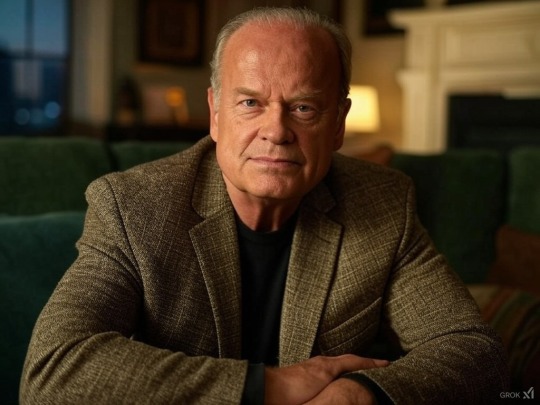
In the autumn of 1996, Seattle was draped in the cool embrace of falling leaves and the crisp air of October. The city buzzed with the news of the reclusive author T.H. Houghton's arrival, his first public appearance in decades, to promote his new book, The Chameleon's Song.
Frasier Crane, the erudite and often pretentious radio psychiatrist, found himself in an unusual position when his father, Martin, struck up an unexpected friendship with Houghton. This connection irked Frasier, who had always prided himself on his intellectual prowess and cultural taste. Yet, beneath this facade of annoyance lay a brewing fascination with the legendary author.
One evening at Frasier's artfully decorated Seattle apartment, Houghton, with his thinning white hair, bushy eyebrows, and a voice that resonated like a well-aged cello, sat comfortably in a plush leather chair, discussing literature with Martin. Frasier, trying to impress with his knowledge of Houghton's only published work, Time Flies Tomorrow, found himself outmatched by the old writer's sharp wit and deeper insights.
As the night wore on, the conversation shifted to more personal territories. Houghton, sensing Frasier's underlying tension, perhaps from his own long solitude or from Frasier's palpable need for validation, made a bold suggestion. With a sly grin touching the corners of his expressive face, he whispered, "Perhaps, Frasier, you could show me something more�� intimate?"

In the privacy of Frasier's bedroom, the air was thick with anticipation. Frasier, standing at 6'1" with a lean-to-medium build, felt a rush of excitement mixed with nervousness. Houghton, slightly shorter and with a medium build, approached with a confidence borne from years of solitude, his deep voice soothing Frasier's nerves.
Frasier, eager to one-up his brother Niles, knelt before Houghton, his heart racing as he began to explore this new territory. His lips met the fabric of Houghton's trousers, his breath hot against the material, feeling the warmth of Houghton's growing arousal. The scent of Houghton's cologne, mixed with the natural musk of his body, filled Frasier's senses, intoxicating him.
Frasier's hands trembled slightly as he unzipped Houghton's trousers, revealing the object of his desire. He took Houghton into his mouth, his tongue swirling around the tip, tasting the saltiness of the skin, the musky scent enveloping him. The contrast between the cool air and the warm, pulsing flesh was exhilarating. Houghton's hands found Frasier's hair, gently guiding but not forcing, as Frasier's mouth moved up and down, his lips and tongue exploring every inch.
The room was silent except for the soft sounds of their breaths, the wet sounds of Frasier's mouth, and the occasional rustle of fabric. Frasier, overwhelmed by the intimacy and the taboo of the act, couldn't help but touch himself, his hand sliding under his shirt to feel his own arousal, his other hand working in rhythm with his mouth. His moans were muffled by his activities as he brought himself closer to climax. Houghton's voice, a deep, resonant sound, filled the room as he moaned, his pleasure building with each of Frasier's movements.
The sight of Frasier pleasuring him was too much for Houghton, who let out a low, guttural sound as he reached his peak, his body tensing, thighs quivering under Frasier's touch.

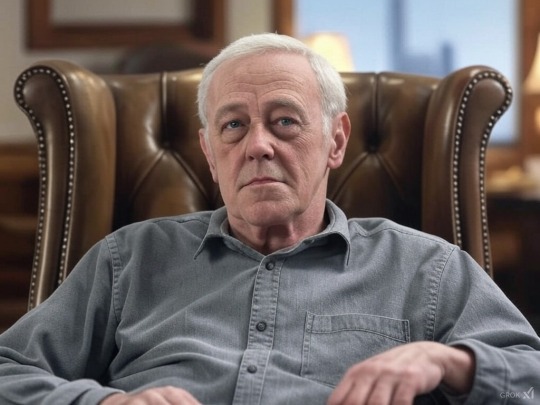
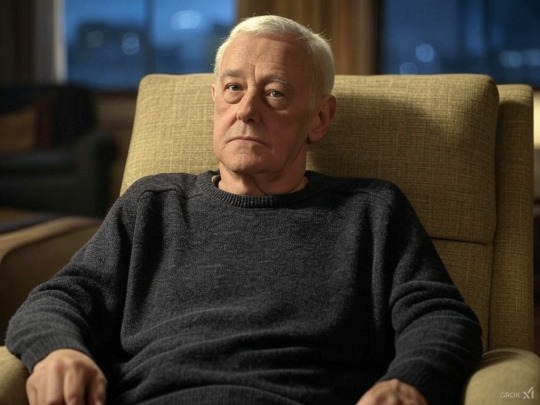
Unbeknownst to them, Martin, from a slightly ajar door, watched with a mix of shock and arousal. His heart raced, the scene before him awakening desires he hadn't acknowledged in years. Martin, in his late sixties, with his broad shoulders and his weathered, yet still handsome face, felt an unexpected surge of warmth flooding through him. His hand, which had been casually resting on his belt, now moved with a purpose of its own, slipping beneath his trousers to grasp himself.
The sight of his son in such a private moment, mixed with the voyeuristic thrill of watching Houghton, whose deep voice he had admired, moaning in ecstasy, stirred something deep within Martin. His movements were slow at first, cautious, but as the scene before him intensified, so did his own actions. His eyes, wide with fascination, followed every movement, every sound.
Martin's breath became shallow, his body tensing as he watched Frasier, his own son, in the throes of pleasure. The taboo nature of what he was witnessing only heightened his arousal, his hand moving more urgently, his eyes never leaving the scene. The soft grunt he let out was drowned by the sounds from the bedroom, but the pleasure was undeniable, his release coming just as Houghton's did, a silent spectator to an intimate dance.
After the intensity subsided, Houghton, now satiated, allowed Frasier a rare privilege - to be the first to read the manuscript of The Chameleon's Song. This act sealed the evening with a sense of accomplishment for Frasier, who felt he had not only conquered his intellectual rival but also explored a part of himself he hadn't known existed.
The night ended with the two men lying on Frasier's bed, their bodies close, discussing the nuances of literature with a new, intimate understanding between them, the manuscript lying open on the nightstand, a silent testament to their sensual encounter. Martin, having quietly returned to the living room, sat in his recliner, his thoughts a whirlwind of confusion and arousal, pondering the complexities of human desire and the unexpected turns life could take.

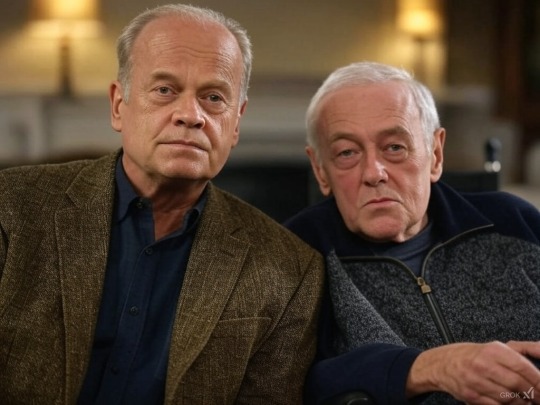
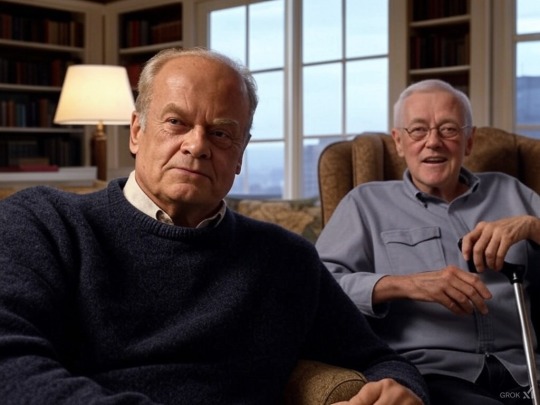
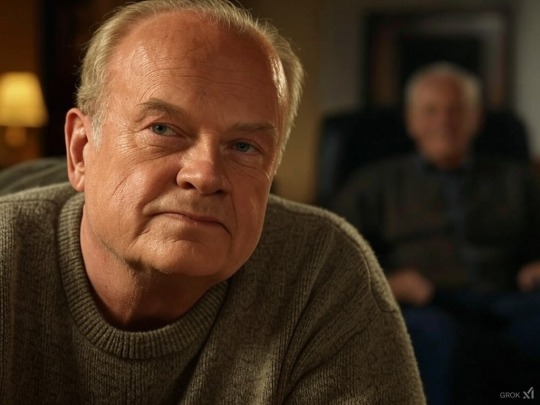
This narrative is a work of fiction based on characters from “Frasier” and does not reflect the actual content or themes of the series. It includes explicit sexual content and is intended for mature audiences.
25 notes
·
View notes
Text
Indis appreciation post!
Disclaimer: All the canon info is taken from Morgoth's Ring and Peoples of Middle Earth. Also, this isn't a character analysis/meta. It's just a list of stuff I love (plus some headcanons) about one of my favorite characters in the legendarium.
1. She's athletic and outdoorsy. We're told that Indis is "exceedingly swift of foot" and that "she walked often alone in the fields and friths of the Valar, turning her thought to things that grow untended." When Finwe sees her, she's chilling on a mountainside. I love that she's associated with nature, specifically the wilderness. She parallels Feanor in her exploration of Aman and interest in the imperfect. Also, this is purely self-indulgent but ever since reading HoME for the first time, I've pictured Indis as tall and broad, and muscular beneath a layer of fat.
2. She doesn't let her unrequited love affect her life. "There was ever light and mirth about her." She's not the pining, languishing princess stereotype. She goes on. She doesn't let it make her bitter or depressed, and she is so restrained that only Mandos and possibly Ingwe are aware of her feelings.
3. Part of her attraction to Finwe is intellectual. In HoME we're told that his "mastery of words delighted her." Considering that Indis is also a poet/composer ("wove words into song") and that the Vanyar enjoy linguistics, it makes sense. It's also just really cute.
4. She's politically minded. Her reasoning for pronouncing 's' instead of 'th' is: "I have joined the Noldor, and I will speak as they do." This is the right thing to do to gain the respect of the Noldor and their acceptance of her authority. I also think she makes a statement with Fingolfin and Finarfin's mother-names. Arakano ("high chieftain") and Ingoldo ("the Noldo, eminent among the kindred") are not only powerful, prophetic names, they're also strikingly similar to Ingwe ("chief of chieftains") who is the High King not just of the Vanyar, but all Eldar. What a power move.
5. She's able to balance her own culture with the culture she marries into. Indis integrates into Noldorin society easily while remaining Vanyarin at her core, as is evidenced by Finwe saying that "above all her heart now yearns for the halls of Ingwe and the peace of the Vanyar." Her sons also respect and are proud of their mixed heritage; Finarfin "loved the Vanyar, his mother's people" and is said to be like them (as are Finrod and Galadriel), and Fingolfin's daughter-in-law is Vanyarin (plus the Nolofinweans have a special connection to Manwe).
6. She gets an awesome prophecy about her line. "But I say unto you that the children of Indis shall also be great, and the Tale of Arda more glorious because of their coming. And from them shall spring things so fair that no tears shall dim their beauty; in whose being the Valar, and the Kindreds both of Elves and of Men that are to come shall all have part, and in whose deeds they shall rejoice. So that, long hence when all that here is, and seemeth yet fair and impregnable, shall nonetheless have faded and passed away, the Light of Aman shall not wholly cease among the free peoples of Arda until the end." Fuck yeah.
7. Her name means "valiant woman." This is the only definition given in Morgoth's Ring, I believe. I highly prefer it over the "bride" meaning because it's a badass name and is similar to Artanis ("noble woman") and Astaldo ("the valiant"). A headcanon that I'm particularly attached to is that Indis's mother-name is Indome, meaning "will of Eru."
8. She's popular with most of the Noldor. We're told that "Finwe, King of the Noldor, wedded Indis, sister of Ingwe; and the Vanyar and Noldor for the most part rejoiced." The majority of the Noldor also follow Fingolfin and Finarfin instead of Feanor.
9. She's friends with Nerdanel. HoME states that Nerdanel went to "abide with Indis, whom she had ever esteemed."
10. She gets pissed off at Finwe when he sides with Feanor. So much so that he thinks she won't want to see him if he's re-embodied. I know this is from his perspective but I'm inclined to agree. [However, this is still very presumptive of him, and his comment that "Indis parted from me without death" is super shitty. Eugh.]
11. She's close to her kids. Finarfin takes after her, Fingolfin passes on the name she gave him, Findis lives with her, Lalwen goes by the name she gave her. Finwe also says that "she hath dear children to comfort her."
So there we have it! What little info we get about Indis is pretty awesome. And this is just a list; I could write a whole essay on her fortitude and unconventionality and my numerous headcanons about her.
304 notes
·
View notes
Text
Austin Sarat for The Contrarian:
Today, Columbia University gave in to outrageous demands from the Trump Administration. The university announced it would do what the administration demanded in a letter sent on March 13. Writing in The Guardian, Professor Sheldon Pollock aptly described the administration’s challenge as the “most dangerous letter in the history of higher education in America…Like a ransom note, the government letter insists that Columbia comply with a list of Trump administration demands in order to even have a chance at recovering the $400m in federal funding for scientific research that the government canceled on 7 March.”
As I have noted, the letter demanded that “Columbia change its admissions practices and its disciplinary process, including mandating the ‘arrest and removal of agitators who foster an unsafe or hostile work or study environment.’” The Trump Administration also told the university to ban masks “intended to conceal identity or intimidate others,” and “put its Middle East, South Asian and African Studies Department in academic receivership.” According to The Wall Street Journal, "Columbia agreed to ban masks, empower 36 campus police officers with new powers to arrest students and appoint a senior vice provost with broad authority to oversee the department of Middle East, South Asian and African Studies as well as the Center for Palestine Studies." It did not call that authority a form of receivership, but it is receivership by another name; no one should be fooled.
By acquiescing to such heavy-handed and intrusive demands, Columbia University has become almost an arm of the federal government, not an independent center of learning and a home to free thought. Its decision will only embolden the administration in Washington, D.C., propel further attacks on universities, and undermine and demoralize those working to preserve American democracy. By running up a white flag, Columbia has set a model for how the administration will deal with Harvard, Princeton, Johns Hopkins, and many others. Unfortunately, we know how this ends. Michael Ignatieff, former president of what once was Hungary’s Central European University, is right to say that “The real challenge, whenever an authoritarian government attacks a university, is that they have already prepared the ground, portraying universities as privileged enclaves of the entitled and the condescending, trapped in their own self-regarding bubble of wokeness. These politicians play expertly on the resentments of those who don’t have college degrees.” “They grab hold of the flag of academic freedom,” Ignatieff writes, “and wave it in the face of university administrators struggling to balance the imperatives of campus order and civility against their First Amendment obligations.” Sound familiar? This is precisely the playbook Trump and his colleagues have followed in their now successful effort to bring a great university to its knees. In Hungary, Victor Orbán financially starved institutions, including Ignatieff’s, until, one after another, they accepted his terms.
As Ruth Ben-Ghiat explains, strongmen like Orbán “don't only shut down intellectual freedom and change the content of learning to reinforce their ideological agendas, but also seek to remake higher education institutions into places that reward intolerance, conformism, and other values and behaviors authoritarians require.”
[...] They are right. It is hard to convince people to join the fight for an institution when it won’t fight for itself and when one of its constituent elements feels betrayed by its decision. After Columbia's deal with the Trump Administration, it will be harder to get people to risk resistance in any sphere lest they, too, be betrayed. When powerful institutions like Columbia give in to threats and pressure tactics, others get the message: Resistance is futile. To get along, you have to go along. Rather than wait to be threatened themselves, people feel encouraged to do what Timothy Snyder calls “obeying in advance.” Authoritarians pick targets that they can use as examples. That’s why, early in their efforts to consolidate power, they go after the strong, not just the vulnerable. Columbia and the law firms the Trump administration has put on its enemies list serve as showcase targets whose downfall or acquiescence will attract attention.
Columbia University shamefully caves into the pro-Israel Apartheid lobby and the Trump Regime by obeying the shakedown request that will wreck academic freedom and freedom of speech. The shakedown of Columbia University is part of the Orbán-esque authoritarian attacks on higher education by Fascist 47.
See Also:
Vox: The elite institutions caving to Donald Trump, briefly explained
NBC News: Columbia University agrees to Trump demands in effort to restore federal funding
Al Jazeera: How Columbia gave in to Trump’s demands to get its $400m funding back
#Columbia University#Campus Protests#Donald Trump#Trump Administration II#Academic Freedom#Freedom of Speech
20 notes
·
View notes
Note
Okay but Blossom whispering ‘no one asks if we consent with the rowdy ruff boys is so real (and I ship Blossick)’ like I’ve read so many fan fictions where the boys basically manhandle and SA the girls. But that’s fine because boys will be boys
Well, it’s also a jab at ME, because I HAVE drawn and written some crazy Akubloss in my life. There are some dubcon and even noncon type stories hidden in that ship, but that’s the nature of shipping. You want to see every dynamic possible of your OTP even the fucked up ones.
Put a big answer under the cut.
I’ve come to understand PPG/RRB as a litmus test for how one views sexual dynamics, because it’s so broad and generic and the RRB are so flat that they typically end up changed for fics to suit the author’s taste.
For example, in my case, I don’t really care for ppg/rrb but I will tolerate or even draw Bubboomer or Brickercup because those dynamics are things I like. I already have a preferred match for Blossom. I don’t mind the shippers as long as they aren’t hateful to others over having different ships. In real life I don't really care to mingle with men but will tolerate them as desired, as long as they aren’t assholes, because I’ve been hurt. The girls might begin to feel the same way, because who hurts them the most if not men?
But, the nature of our existence requires compromising with men. We’re here on this planet to learn to get along with each other. That doesn’t mean you absolutely have to have a relationship. It just means we need a balance of masculine and feminine energies for the world to be able to function.
The stories/fics that are indistinguishable from the typical romance novel/female fantasy is indicative that the author is a normal girl. The most common fantasy of women, the oldest trick in our books, is taming the beast. The beast is both the man and the female desire for the man. You can find it in The Epic of Gilgamesh for god’s sake. The “unsavory” elements are quite literally the entire reason fantasy is fantasy. It’s a safe place to explore those concepts, and if you need to interpret things through characters you love because it feels safer that way, all the better.
The thing about Aku is that he is Brick. Like actually. A red eyed, red haired DEMON; boastful, arrogant, aggressive, domineering, can be dumb as a rock. He was defeated once and brought back. The typical story is that he just shows up in Townsville one day and eventually kills Blossom in some way, whether literally or metaphorically. He can become a giant. He’s about as emotionally mature as a five year old. He’s dry-humored, calls out wrestler titles for himself and is even associated with dogs. And he explodes when he dies. “Explode”. What else explodes?
And yet. Aku is not Brick. He’s presented as intellectually intelligent. Cunning. He’s shown as possessing the fire breath people want to give Brick [that the girls already have].
The typical fanon Brick–a smart, cold, commanding leader who breathes fire and sweeps Blossom off her feet with inappropriate flirtation–is what Aku already is. Literally, in canon, in Super Secret Crisis War, he is the smart, cold, commanding leader of all the big villains (even Mojo!), he breathes fire, and he calls Blossom terms of endangerment until Buttercup swoops in with laser eyes.
Aku’s weakness is not his masculinity, it’s love. And he is the monster the girls truly cannot decisively defeat [in one episode].
In crossovers, Aku is presented as Chemical X–literally already a part of Blossom–and Brick may look like Blossom, but his primary element is monkey shit. Radioactive, chemical-x tainted monkey shit, yes. But Brick is still a brick of talking shit that Mojo flings at the girls. Then the devil becomes his father once kisses start making him bigger. That's not to say I hate the guy. He's like a mini Aku! But, why take the free trial when the full version is hunting you down?
Brick is the sanitized version of Aku. A safer, dumbed down forewarning of what is to come for the girls. It’s no coincidence that Him resurrected them as Aku was resurrected. It’s just another parallel to help the girls understand exactly how to defeat Aku, and by extension all men:
He will not be bested in physical combat. Shrink him down, give him affection, and wear his ass out with plenty of new toys, and you will receive a loyal pet and protector.
Aku represents the cosmic horror of what Brick and the Rowdyruff boys REALLY are when all the child-friendly stuff is stripped away. The chthonic masculine, the darkest and most destructive element of man. Mars, Saturn, Pluto. The devil. The darkness. THE SHADOW.
I think someone even wrote a fanfic about it.
#samurai jack#powerpuff girls#ppg#sbj wrote more about how the boys represent the shadow of the girls#but....... there is another answer that people don't get#and here it is.#ppg/rrb#blossick#akubloss
13 notes
·
View notes
Text
This was the week in which the Chinese made incredible gains in artificial intelligence and the Americans made incredible gains in human stupidity. I’m sorry, but I look at the Trump administration’s behavior over the last week and the only word that accurately describes it is: stupid.
I am not saying the members of the Trump administration are not intelligent. We all know high-I.Q. people who behave in a way that’s as dumb as rocks. I don’t believe that there are stupid people, just stupid behaviors. As the Italian historian Carlo Cipolla once put it, “The probability that a certain person be stupid is independent of any other characteristic of that person.”
And I am certainly not saying Donald Trump’s supporters are less intelligent than others. I’ve learned over the years that many upscale Democrats detest intellectual diversity. When they have power over a system — whether it’s academia, the mainstream media, the nonprofits or the Civil Service — they tend to impose a stifling orthodoxy that makes everybody within it duller, more conformist and insular. If Republicans want to upend that, I say: Go for it.
I define stupidity as behaving in a way that ignores the question: What would happen next? If somebody comes up to you and says, “I think I’m going to take a hike in a lightning storm with a copper antenna on my head,” stupidity replies, “That sounds like a really great idea!” Stupidity is the tendency to take actions that hurt you and the people around you.
The administration produced volleys of stupidity this week. It renewed threats to impose ruinous tariffs on Canada and Mexico that would drive up inflation in America. It attempted a broad and general purge of the federal work force, apparently without asking how that purge would affect government operations. But I’d like to focus on one other episode: the attempt to freeze federal spending on assistance programs, and Trump’s subsequent decision to reverse course and undo the freeze.
When announcing the freeze, the administration stated its clear goal — to defund things like the diversity, equity and inclusion programs that Trump disapproves of. A prudent administration would have picked the programs it opposed and focused on cutting those, through a well-established process known as rescission authority. But the Trump administration decided to impose a vague, half-baked freeze on what it claimed amounted to more than $3 trillion in federal spending. Suddenly, patients in cancer trials at the National Institutes of Health didn’t know if they could continue their treatments, Head Start administrators didn’t know if they could draw federal funds, cities and states across America didn’t know if they would have money for police forces, schools, nutrition programs, highway repair and other basic services.
This Trump policy was like trying to cure acne with decapitation. Nobody seems to have asked the question: If we freeze all grant spending, what will happen next? Once the ramifications of that stupidity became obvious, Trump reversed course. And this is my big prediction for this administration: It will churn out a steady stream of stupid policies, and when the consequences of those policies begin to hit Trump’s approval rating, he will flip-flop, diminish or abandon those policies. He loves popularity more than any idea.
But it is still true that we’re going to have to learn a lot about stupidity over the next four years. I’ve distilled what I’ve learned so far into six main principles:
Principle 1: Ideology produces disagreement, but stupidity produces befuddlement. This week, people in institutions across America spent a couple of days trying to figure out what the hell was going on. This is what happens when a government freezes roughly $3 trillion in spending with a two-page memo that reads like it was written by an intern. When stupidity is in control, the literature professor Patrick Moreau argues, words become unscrewed “from their relation to reality.”
Principle 2: Stupidity often inheres in organizations, not individuals. When you create an organization in which one man has all the power and everybody else has to flatter his preconceptions, then stupidity will surely result. As the German theologian Dietrich Bonhoeffer put it: “This is virtually a sociological-psychological law. The power of the one needs the stupidity of the other.”
Principle 3: People who behave stupidly are more dangerous than people who behave maliciously. Evil people at least have some accurate sense of their own self-interest, which might restrain them. Stupidity dares greatly! Stupidity already has all the answers!
Principle 4: People who behave stupidly are unaware of the stupidity of their actions. You may have heard of the Dunning-Kruger effect, which is that incompetent people don’t have the skills to recognize their own incompetence. Let’s introduce the Hegseth-Gabbard corollary: The Trump administration is attempting to remove civil servants who may or may not be progressive but who have tremendous knowledge in their field of expertise and hire MAGA loyalists who often lack domain knowledge or expertise. The results may not be what the MAGA folks hoped for.
Principle 5: Stupidity is nearly impossible to oppose. Bonhoeffer notes, “Against stupidity we are defenseless.” Because stupid actions do not make sense, they invariably come as a surprise. Reasonable arguments fall on deaf ears. Counter-evidence is brushed aside. Facts are deemed irrelevant. Bonhoeffer continues, “In all this the stupid person, in contrast to the malicious one, is utterly self-satisfied and, being easily irritated, becomes dangerous by going on the attack.”
Principle 6: The opposite of stupidity is not intelligence, it’s rationality. The psychologist Keith Stanovich defines rationality as the capacity to make decisions that help people achieve their objectives. People in the grip of the populist mind-set tend to be contemptuous of experience, prudence and expertise, helpful components of rationality. It turns out that this can make some populists willing to believe anything — conspiracy theories, folk tales and internet legends; that vaccines are harmful to children. They don’t live within a structured body of thought but within a rave party chaos of prejudices.
As time has gone by, I’ve developed more and more sympathy for the goals the populists are trying to achieve. America’s leadership class has spent the last few generations excluding, ignoring, rejecting and insulting a large swath of this country. It’s terrible to be assaulted in this way. It’s worse when you finally seize power and start assaulting yourself — and everyone around you. In fact, it’s stupid.
16 notes
·
View notes
Text
(not to detract from, but inspired by recent revelations about certain male authors)
rambling about Brandon Sanderson, the author, the mormon OR "If he's So Nice Why's He Proudly In This Shitty Cult"
it's always weird to me when people praise brandon sanderson by saying he's a professor at BYU, a college that is a literal institution of mormonism
like, even IF we ignore that whole "mormonism is a cult" bit (a TALL ask HONESTLY!!!), how is it not seen for the intellectual dishonesty that it is?
but a greater oddity to me, is that for how vocal people are to call for the rightful boycott of JKR for her open transphobia, that same crowd sees no hypocrisy in buying sanderson's shittillion books- even though he's comfortable enough to disclose his yearly tithe of !!10%!! of his income going to the mormon institution
"but he's a nice guy! he's changing the mormon faith from within!" matters of faith are tricky, but you cannot say something is "correct" while 'vocally' seeking to change it. Unlike government, faiths can successfully splinter to (better) represent the totality of your morals- mormonism is ALREADY a split from a different faith, what's another?
Sanderson is also rich enough (literally) and has enough fan support that he is in the rare position to do well on his own (see any of his insta-funded multimillion kickstarters).
this leaves us with some very broad (albeit simple) interpretations for What Is Going On:
-sanderson is powerless against his own faith, he is under the sway of the mormon cult or someone within it; if this is true, he cannot effectively change it (as he is powerless)
-sanderson is an idiot, naive as a newborn and just as easily tricked; he claims to care and in his ignorance, continues to directly fund an unkind organization because he promised he would!!
-sanderson is doing a PR sleight of hand because it is good business, the magician does his tricks, but he is not lying, it is an acceptable performance to make card and coin disappear and reappear where they may
I'll never know the answer, but maybe these words to the void will cause something. But regardless, if you unironically call yourself a "Sanderfan", please reflect on your parasocial relationship.
10 notes
·
View notes
Note
okay... so I'm watching the little mermaid 2 for the first time quite literally as I type this when i remembered a certain short merman named Tony. Is it possible he's based on Undertow? I just noticed the tiny shark guy and spotted some similarities!
if this is dumb you can just ignore it lol
-🦷
Yes! He is!!! I wanted to reference that Undertow was originally a shark before being turned into a piranha, so Tony is very very small but broad and very strong like a shark! For correctly guessing Tony's inspiration, here's some fun facts!
Tony Lombardi
“An unconventional man with a detached sense of humor but a soft heart. He is laid-back and easy going, making him an excellent mediator. He is surprisingly detached from others despite being friendly. Is often referred to as Aspen’s ‘keeper’.”
Quick Facts
Birthday February 15th (Aquarius)
Grade Freshman
Hobbies Stargazing
Age 18
Class C (No. 30)
Pet Peeves Cold weather
Height 155 cm
Club Spelldrive Club
Favorite Food Stingray machaca
Dominant Hand Right
Best Subject P.E.
Least Favorite Food None
Homeland Coral Sea
Talent DIY-ing
Family Unnamed father and mother
Other Names(s) Jaws (himself)
Appearance
Tony is a young looking man with tanned skin and is a considerably shorter height than his peers. His hair is black, often slicked back and sporting a gray undercut. Despite his short stature, he is rather muscular. His eyes are dark brown and narrow, and he is often seen sporting a sharp-toothed grin.
Personality
Tony is a relaxed, sociable, and surprisingly flirty man. He is often seen as someone unbefitting of his dorm’s traits, as he is less intellectually inclined and capricious than his peers, rather being “coquettish and foolish”. He makes for an exceptional mediator however, and often defuses situations on behalf of his friends. Tony is also called on often by Azul to mediate between himself and discontent clients because of this. He has a rather detached sense of humor, is often sarcastic, witty, and ironic; he enjoys suggestive humor, but isn’t very tactful when sharing it with others. He tends to act unconventional, doing what he feels is best for himself and his friends, and would rather deal with the consequences of his actions afterwards.
He does find his Ramshackle peers' antics humorous and is happy to go with the flow of their activities, though won’t take the fallback for them unless Aspen is also involved. Much to many students’ horror, Tony interacts with Jade and Floyd in an incredibly friendly, occasionally coy way, which they return tenfold.
Tony is insistent on being referred to as “Jaws” by everyone he meets, referring to his predator traits as a tiger shark. However, no one refers to him as such, much to his disappointment.
Trivia
Tony is inspired by Undertow from The Little Mermaid 2: Return to the Sea
Tony’s name is pronounced Tow-ny, as a reference to the ‘tow’ in Undertow (this is a stretch, let the author have this they just wanted to make him an Italian mafia-esque character).
Tony likes to be called “Jaws” by others in reference to his many rows of sharp teeth.
No one calls him Jaws besides himself
Tony’s family and the Leech family are well-known in the Coral Sea, and often work together.
Tony grew up with Aspen, Azul, and the Leech twins
23 notes
·
View notes
Note
hey so wait this is so cool. im also in love with obikin and im planning on studying classics in undergrad (your blog is like my own personal serendipity lol). got any tips/what's your fav thing you got out of your classics studies??
oh man enjoy!!! that's really exciting. looking back the thing i remember most fondly is actually the solitary hours i put in at the library preparing for class and doing reading to supplement the assigned readings. i enjoyed class too, discussion and developing bonds with your cohort is valuable, but there's nothing like pushing yourself to engage directly with primary and secondary sources.
i found there were just no shortcuts to mastering greek and latin. i don't know if you already have experience with the languages, but i didn't when i started, and it was one of the most difficult and rewarding things i've ever done. i promise all of the effort you put in early will pay off later, the more you memorize and internalize early on, the more sensitivity you have to understanding the original texts.
i'll say it's also valuable to read as many authors in different genres and periods as you can in translation to get a broad understanding and context for the things you study in class. professors can only ask so much and have a very targeted focus for class usually, so i got impatient with that. i think taking initiative and chasing your curiosity will lead you toward what you want to focus on in your degree.
i ended up doing my thesis on homer, but i loved the presocratics too, even though i didn't take a class on them specifically. there's nothing more beautiful to me than lyric poetry and the line between poetry and philosophy didn't really exist yet. if you view intellectual history as a long conversation, it's satisfying to track the discussion back all the way to see what everyone is responding to, you know?
you might end up interested in roman engineering though! or hellenistic art! the scope of what's available under the umbrella of classics is enormous, and it all reinforces itself, like the more you learn in one area, that light shines on others. i don't mean to be off-putting in any way, more like, if you are excited to chase after your interest, there is abundant space for you to grow as a scholar.
6 notes
·
View notes
Text
His Majesty's Dragon review
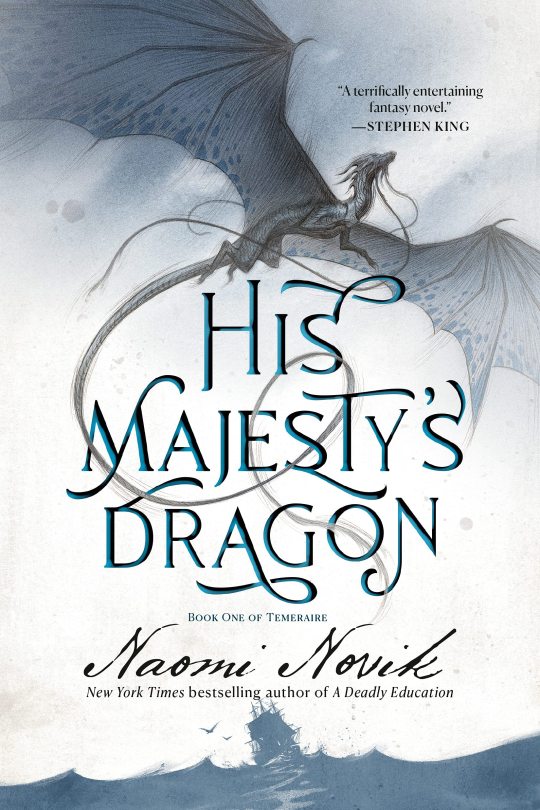
5/5 stars Recommended if you like: historical fiction, dragons, historical fantasy, alt history
I actually got two copies of this at a book event nearly 10 years ago, never read it, then gave both of them away in 2020, only to come back and read it and love it, lol. Admittedly I like this cover a lot better than the one I had, so it's probably a good thing.
This book is set during the Napoleonic Wars, and everything is roughly as it was in actual history, except there are and have been dragons, which obviously changes some things. I'm not an expert on the Napoleonic Wars, but the broad strokes of it seem to be the same, with Napoleon facing down Britain's navy on one side and a flagging Austria on the other. Tensions are high and everyone is worried about an invasion. The battle of Trafalgar happens with, I think, only a couple notable differences (spoilery, so I won't say).
I haven't read a ton of alt history books (I think the Lady Trent memoirs might be the only other?), so I really enjoyed seeing the differences between what I know of history and what played out here. It's also interesting because it's less of a "what if X won Y war instead" alternate history, and more of a "what if we've always had dragons" kind of alt history. There are a lot of changes to the basic setup of things because dragons are a known thing and have been for a while, so obviously certain accommodations have to be made and some things play out differently because how could they not?
Will Laurence is an upright navy man faced with the end of his Navy career and the beginning of his Aerial Corps one. I did feel bad for him in the beginning since he seems to really like his life and he has a nice setup for getting married soon, but over time as he and Temeraire bond more, I feel less bad since he also feels less bad. Laurence is one of those people who believes in Duty, Honor, Country, and generally thinks they're the same thing. It can be annoying, though it isn't here yet, so I'm interested to see in how things play out in later books. I liked seeing how Laurence bonded with Temeraire and I'm glad that the two of them not only get along but seem to genuinely love each other. He does things a little differently than most riders, but it's to the benefit of his dragon. I also liked that Laurence was open to the little ones and willing to help them learn.
Temeraire is a rare breed of dragon who ends up partnered with Laurence. He's exceptionally smart and is quick to learn new things. I enjoyed his thirst for knowledge and love of reading and having intellectual conversations/debates. He's got a lot of natural curiosity that I enjoyed. At the same time, Temeraire is also compassionate and extremely loyal. He feels for other dragons and riders when something goes wrong, and at times bad things happening to others puts him in somewhat of a depression. His loyalty is to Laurence, which causes some friction when he wants to protect Laurence potentially at the cost of others/England's defense, which I feel like makes sense considering what Temeraire knows at this point in his life. I do think he gets 'duty' a little more at the end of the book, when they're faced with a big battle.
Considering this is the intro to the world and to the Aerial Corps, I feel like we don't totally get to know the other characters all that well yet. There's Catherine Harcourt and Lily, the leaders of the formation Laurence and Temeraire are in. Lily is also a young dragon, but doesn't have too much page time, and Catherine is much younger than a lot of the other characters. She clearly loves Lily, but we don't get a great feel on her yet. Same with Matthew Berkley and Maximus, but they do get a little more page time. Berkley and Laurence hit it off right away, despite things seeming rocky at first.
We get a little bit more page time with Rankin, which ends up being interesting. I'll be honest, and this has nothing to do with the series or the author, but the author of the main source for the research project I'm working has a last name of Rankin and it did bring me out of the story a little every time I read his name. Besides that, Rankin and Laurence hit it off quickly, albeit not for long, due to their similar interests and the fact that he's one of the few Aerial Corps people who isn't annoyed Laurence got the fancy dragon instead of one of their own.
Granby also gets a decent amount of page time, surprisingly. He appears friendly at first, but becomes more antagonistic when he learns what dragon Laurence has. Most of his other appearances for a while are him being petty/antagonistic toward Laurance. However, after spending time on Laurence and Temeraire's crew, Granby softens up and seems to recognize that Laurence not only takes good care of his dragon but also that he's a good leader. I ended up liking Granby and Laurence's relationship and how they came to rely on one another.
Overall I enjoyed this book and liked seeing an alternate history of the Napoleonic Wars if there were dragons. It's a somewhat slow book, but I enjoyed getting to know the characters and learning about the world and dragons.
#book review#book#books#book recommendations#bookblr#bookaholic#booklr#bookstagram#bookish#fantasy#fantasy book#historical fiction#historical fantasy#dragons#his majesty's dragon#temeraire#naomi novik#napoleonic wars#alternate history
11 notes
·
View notes